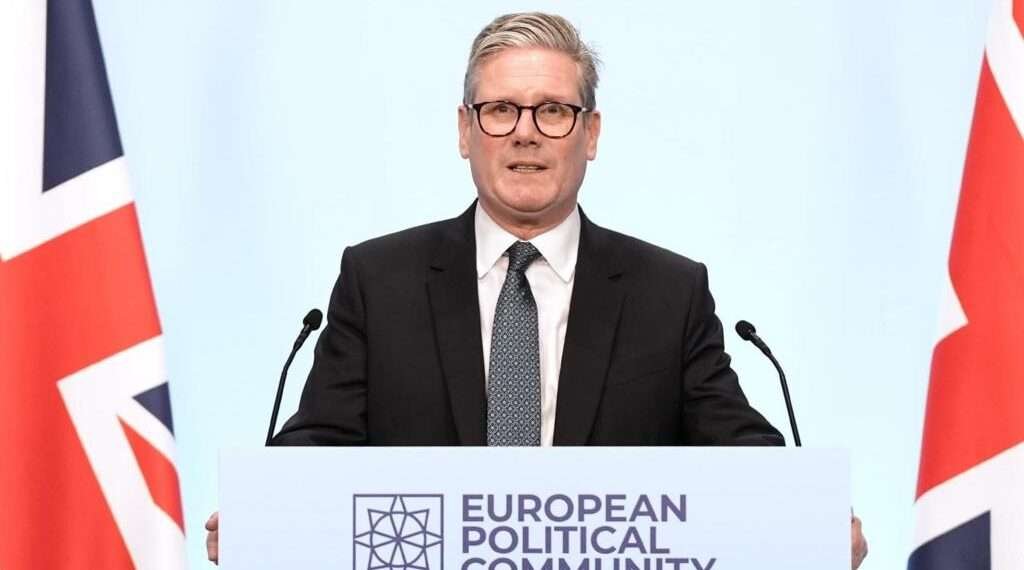For years now, the issue of how to process asylum seekers has been a bone of contention between the Labour and Conservative Party.
However, Prime Minister Keir Starmer is considering plans to process asylum seekers outside the UK as part of a broader reevaluation of immigration policies.
This comes at a time when a potential returns agreement with the EU appears increasingly unlikely.
Speaking at the European Political Community summit at Blenheim Palace, the Prime Minister expressed openness to the idea of offshore processing.
The summit, which brought together European leaders, included a discussion with Edi Rama, the Albanian Prime Minister, whose country processes asylum claims for Italy.
However, Starmer indicated that a deal to return refused asylum seekers to the EU was not a current priority. French President Emmanuel Macron echoed this sentiment, stating that France was unwilling to take on the additional burden.
“In relation to the agreement between Albania and Italy, obviously there’s interest in how that might work, but that wasn’t actually the central discussion in the task force in the roundtable. That was about the practical measures that we want to discuss, which is about how we deal with taking the gangs down in the first place.”
Keir Starmer
He emphasized his pragmatic approach, stating, “I’m a practical person. I’m a pragmatist. And I’ve always said we’ll look at what works and where cases can be processed closer to the origin, then that is something which of course ought to be looked at.”
The Prime Minister also addressed the idea of a new returns agreement with the EU, which he had previously committed to pursuing.
“The returns agreement only comes into being at the end of the process; my focus is at the beginning of the process, to make sure we actually secure our borders. Because the problem we’ve got at the moment is we’ve got tens of thousands of people who are here who shouldn’t be here who aren’t being processed.”
Keir Starmer
Following Starmer’s press conference, Macron told reporters, “If [the Brits] want to fix the situation in the Channel it is not just a bilateral [solution]. We will not take the full burden of those who are just going through France to join you.”
UK Mends Relations With EU
The summit at Blenheim provided Starmer an opportunity to reset Britain’s relations with the EU. The new government aims to improve arrangements for migration, security, and agricultural trade.
Addressing over 40 European leaders, Starmer expressed a desire to mend ties after years of strained relations post-Brexit.

“We want to work with all of you to reset relationships, rediscover our common interest, and renew the bonds of trust and friendship that brighten the fabric of European life,” he said, assuring them that Britain would not leave the European Convention on Human Rights under his leadership.
Other leaders praised Starmer’s diplomatic efforts, even as formal renegotiations remain distant. Macron acknowledged the “new momentum” Starmer had brought to political life and domestic politics.
The prime minister’s approach to tackling illegal migration by clamping down on people-smuggling gangs was well-received by his counterparts, and he announced increased UK cooperation with Europol in The Hague.
Despite these diplomatic strides, Starmer faces immediate pressure to reduce the number of people crossing the Channel. Over 10,000 individuals have made the journey this year alone.
“We’ve inherited a really bad problem from the government … We’ve got record numbers this year, and we can’t switch that in 24 hours, in one week,” Starmer acknowledged.
Labour has been exploring an offshore processing plan since before the election, viewing it as a potential solution to reduce small boat crossings.
The party previously investigated a similar scheme during David Blunkett’s tenure as home secretary, considering sending asylum seekers to Tanzania.
Government officials have stated that any offshore processing scheme must meet three criteria: deterring new asylum seekers, being cost-effective, and complying with international law.
READ ALSO: NDC Underscores Mahama’s Substantial Role in the Development of NIA System





















